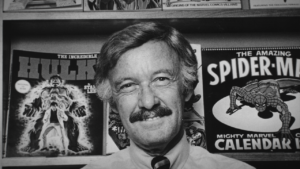In Cold Blood Money: All The Journalists’ Men
Film historian and author Ed Rampell registers a shift in popular depictions of journalists on big and small screens since 9/11, linking the recent skeptical, critical portrayals of iconic media figures like Truman Capote (played by Toby Jones, above) to the evaluation of mainstream journalism's performance.
Ed Rampell Movie depictions of journalists have changed. Gone are Watergate’s crusaders toppling tyrannical Tricky Dick in 1976’s “All the President’s Men,” and swashbuckling foreign correspondents in the 1980s’ “The Year of Living Dangerously,” “Under Fire” and “Salvador,” starring Mel Gibson, Nick Nolte and James Woods, respectively.
Tinseltown now prefers to be critical of reporters and writers, a trend that has mushroomed during the Iraq war. “Shattered Glass” of 2003 dramatizes New Republic staffer Stephen Glass’ falsifications. In 2005’s “Thank You for Smoking,” Katie Holmes’ ruthless newswoman sleeps with tobacco lobbyist Aaron Eckhart. Scarlett Johansson also breaks journalism’s ethics code, bedding a source in Woody Allen’s 2006 film “Scoop.”
Unscrupulous fashion journalists appear in ABC’s “Ugly Betty” and 2006’s “The Devil Wears Prada,” with Meryl Streep as hellish editor Miranda Priestly. In 2006’s “All the King’s Men,” reporter Jack Burden (Jude Law) is seduced by populist candidate Willie Stark (Sean Penn). After Stark is elected, Burden becomes a political operative “embedded” in the governor’s office, conducting opposition research for the increasingly corrupt strongman.
The trailer for 2004’s “Crónicas,” starring John Leguizamo, states: “On the trail of a serial killer, one reporter is about to cross the line”; the movie’s tagline is: “If It’s on TV, It Must Be the Truth.” In the recently released “Zodiac,” a detective played by Mark Ruffalo and a San Francisco Chronicle investigative reporter portrayed by Robert Downey Jr. can’t catch another serial killer — Jake Gyllenhaal’s cartoonist is the one who apparently cracks the case.
Philip Seymour Hoffman won the 2005 best actor Oscar for “Capote.” “Infamous” (2006) similarly details Truman Capote’s coverage of the Kansas murders of “In Cold Blood.” Both depict the eccentric author as duplicitous. Like Katie and Scarlett, “Infamous’ ” Capote (Toby Jones) apparently has sex with a source, imprisoned murderer Perry Smith, played by Daniel Craig, the new 007. Capote’s “Black and White Ball” is briefly glimpsed in “The Hoax,” although Michael Burg as the writer didn’t make the final cut.
What explains this cinematic soul-searching about unethical chroniclers? Their morphing from muckrakers into materialistic, manipulative gossips is epitomized by the resurrection of Capote, who died in 1984 but now symbolizes the mainstream media’s tabloid obsessions.
“Infamous” screenwriter/director Douglas McGrath noted, “If you look at what entertainment is now, and what reporting is now … the areas have merged. … [W]hat Truman started … was [to] bring what [was] considered a trashy subject, he made it acceptable by writing about it, because he was an artist. Since then, many less gifted artists have done the same thing. … He kind of started it. Also, his whole self-promotion … is quite resonant with [today’s] culture.”
McGrath explained Capote’s “nonfiction novel”: “In the old days, newspaper reporting was … very strict [on how] things were written. [Capote] wanted to bring … techniques of fiction to the telling of a nonfiction story, which means you could get inside someone’s head, and say, ‘President Bush was thinking that even if there weren’t weapons of mass destruction …’ which would be more novelistic. … [I]t’s a crock.”
In “Infamous,” Sandra Bullock as Harper Lee — Truman’s childhood friend who assisted him in Kansas and the author of “To Kill a Mockingbird” — confronts Capote. McGrath recalled: “When he first says … ‘of course, everything in the book’s going to be true, but I want to use the techniques of fiction to tell a nonfiction story,’ [Lee] says, ‘Well, what techniques of fiction? The ones where you make stuff up?’… [Lee] sees how he’s already starting to color things in ways that don’t [jibe] with what she’s been hearing. … She says… ‘reportage means re-creating, not creating.’ “
Gore Vidal, who is played by Michael Panes in “Infamous,” called Capote “a pathological liar. Little did I know that my native land … had fallen in love with … people who pretended to be other than they were. … Capote was somebody who lied about everything. … Dumbed-down journalists, of which there are 10 million … took down every word he said. They knew he was lying.” After mimicking Bush discussing “pre-emptive war,” Vidal mused: “This thing of taking what they think is authority’s word for everything — Truman was no authority on anything.”
Asked whether Capote’s revival reflected prewar media disinformation, “Capote” director Bennett Miller said, “It may be a byproduct. … ‘Capote’ could be interpreted that way.” After having ballyhooed President Bush’s big lies about Saddam Hussein’s make-believe WMD, The New York Times and The Washington Post published post-invasion apologies for their propaganda. If Capote brought novelistic techniques to nonfiction, Judith Miller, who filled Times front pages with all the mendacity unfit to print, used nonfiction techniques to create fiction.
“Never let the truth get in the way of a good story” is the tagline of “The Hoax,” a biopic about Clifford Irving (Richard Gere), who faked Howard Hughes’ 1971 “authorized autobiography.” Lasse Hallström’s film, which opens April 6, ties Irving’s phony “autobiography” into Watergate. Archival footage includes Nixon campaigning for senatorial candidate George H.W. Bush.
According to screenwriter William Wheeler, disinformation about Iraq “initially informed the writing of “The Hoax.” … We stumbled across something. Events overtook us, became more relevant; we backed into … the war, WMDs.” Wheeler “found analogies between Howard Hughes and Halliburton, Nixon and Bush,” whose Iraq frauds, endlessly repeated by corporate media, form the greatest hoax since Goebbels was Nazi propaganda minister.
Meanwhile, as the mainstream media blur fact and fiction, fake news grows in popularity, with “The Colbert Report” and Jon Stewart’s “The Daily Show.” In “Borat,” sham newsman Sacha Baron Cohen covers America for Kazakh TV.
The implicit becomes explicit in 2006’s “Shut Up & Sing,” about the firestorm after Dixie Chicks singer Natalie Maines denounced Bush and the Iraq war. Co-directed by Barbara Kopple and Cecilia Peck, the documentary includes clips of Fox pit bulls Bill O’Reilly and Sean Hannity and others “Dixie Chicking” the dissenters, followed by subsequent media reports disclosing that Iraq had no WMD and thus absolving the Chicks.
Why did the post-9/11 press fail in its watchdog role? For multimillionaire anchors and news tycoons with business pending before Washington, dollars are a major consideration in this age of media consolidation and deregulation. (Call it “In Cold Blood Money.”) Reporters who don’t kowtow face reprisals, including loss of access and credentials. Grant Heslov, co-writer/producer of “Good Night, and Good Luck,” spoke of “fear that if you speak your mind, if you question the war … you’ll be called ‘unpatriotic.’ There was lots of self-censoring going on. … [O]ur film addresses those issues. … After 9/11, there was a chill … in the air.”
Journalism’s screen image has not faded out — yet. While some films criticize reporters and writers, documentaries such as Michael Moore’s “Fahrenheit 9/11” fill the void left by the MSM. “Shut Up’s” Peck observes: “There’s an increasing interest in documentaries [and] yearning for the truth.”
The Oscar-nominated “Good Night, and Good Luck” (2005) is about journalistic Galahads Edward R. Murrow (David Strathairn) and Fred Friendly (George Clooney), who helped bring down fascistic Sen. Joseph McCarthy on CBS-TV. Heslov said: “When George and I conceived this … it was to [ask]: Is the media questioning authority enough? …[T]hat’s the fourth estate’s most important job. Clearly, they weren’t doing that during the lead-up to the war.”
Will all the king’s horses and all the president’s men put journalism’s onscreen portrayal back together again? Later this year, Angelina Jolie and Dan Futterman (screenwriter of “Capote”) co-star in “A Mighty Heart,” about Daniel Pearl, the American reporter beheaded in Pakistan. Today’s journalists face a tight deadline: Follow in the footsteps of either Capote or Murrow.
Los Angeles-based film historian Ed Rampell (named after Edward R. Murrow) wrote “Progressive Hollywood: A People’s Film History of the United States” (The Disinformation Co., 2005).
Your support matters…Independent journalism is under threat and overshadowed by heavily funded mainstream media.
You can help level the playing field. Become a member.
Your tax-deductible contribution keeps us digging beneath the headlines to give you thought-provoking, investigative reporting and analysis that unearths what's really happening- without compromise.
Give today to support our courageous, independent journalists.






You need to be a supporter to comment.
There are currently no responses to this article.
Be the first to respond.